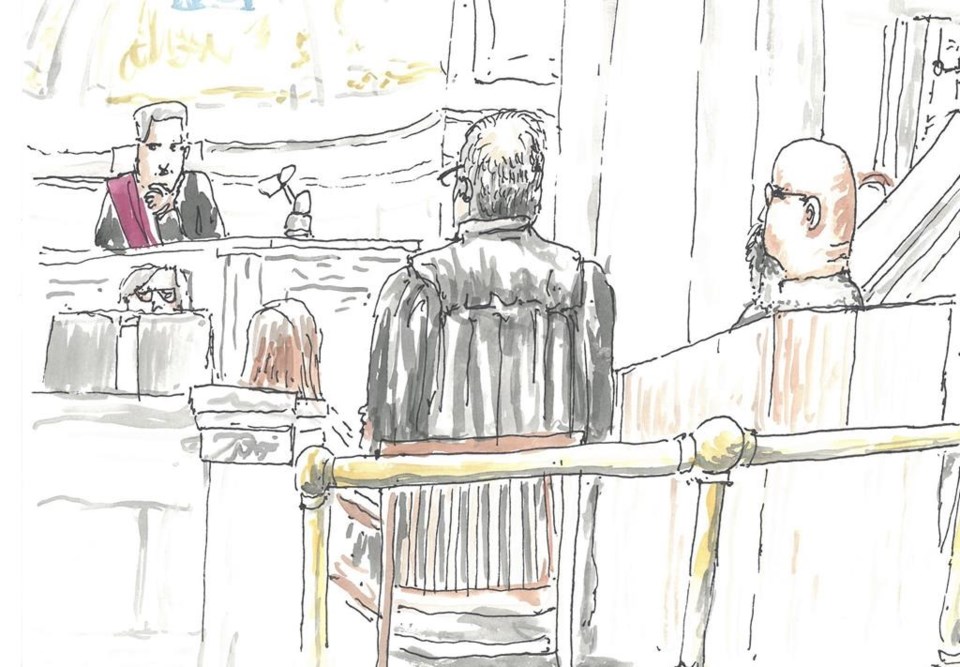WINNIPEG ŌĆö A staffer at a Winnipeg homeless shelter has testified admitted serial killer Jeremy Skibicki once said he had come in to search for a victim.
Ronald Norman told court Wednesday that he had a couple of interactions with Skibicki while working at the Indigenous-led 24-hour warming space, N'Dinawemak - Our Relatives' Place.
One of those conversations started with Skibicki approaching Normand.
"He came up to me and told me that he didn't need to be there, that he had his own place,ŌĆØ Norman told Chief Justice Glenn Joyal.
ŌĆ£(Skibicki said) he was just there to stalk his victims.
"I hear things in the shelter, everyday (people) going through psychosis and stuff ... but that stuck out to me."
Skibicki is on trial in Court of KingŌĆÖs Bench charged with four counts of first-degree murder. His lawyers have said they will argue that while Skibicki killed the women, he is not criminally responsible due to an undisclosed mental illness.
Skibicki, 37, has pleaded not guilty to the 2022 slayings of Rebecca Contois, 24; Morgan Harris, 39; Marcedes Myran, 26; and an unidentified woman Indigenous leaders have named Mashkode Bizhiki'ikwe, or Buffalo Woman.
Crown prosecutors say the killings were racially motivated and Skibicki preyed on the vulnerable Indigenous women at homeless shelters.
Court has heard he assaulted the women, strangled or drowned them and disposed of their bodies in garbage bins in his neighbourhood. Two women were dismembered.
Normand testified that Skibicki would visit the shelter almost daily, shaved and wearing clean clothes.
He said Skibicki never appeared to be under the influence of drugs or alcohol or in a psychotic state, but often kept to himself.
"To me it looked like (Skibicki) was looking for somebody," said Normand.
During cross-examination, Normand was quizzed further on the conversation between him and Skibicki.
"Would it be fair to characterize that conversation as weird?" asked defence lawyer Leonard Tailleur.
"Yeah," said Normand.
Court heard individuals accessing the shelter's services were required to provide their name, birthdate and where they were from during each visit.
Asked if Skibicki ever tried to hide his identity in any way, Normand replied he didn't know as he wasn't in charge of collecting the information.
Earlier Wednesday, court heard from three people who lived in the same building where Skibicki lived and killed the four women.
Allan MacKay said he confronted Skibicki after hearing the man running up and down the stairs in the middle of the night.
When MacKay opened his apartment door, he saw Skibicki.
"He came downstairs carrying a couple of baskets in his arms," MacKay testified. He said Skibicki told him, ŌĆ£I'm getting rid of garbage.ŌĆØ
MacKay testified he didn't see what was in the wastebaskets Skibicki was holding. He said it was the first time he had encountered Skibicki taking out garbage in the middle of the night.
Hours later, the partial remains of Contois were found in a garbage bin near the apartment.
Allen Cohan told court he saw Skibicki throwing a "big armful of clothes" into a garbage bin the evening before Contois's remains were found.
Police later collected the clothing and confirmed it belonged to some of the victims.
Richard Patkau said he shared a wall with Skibicki and woke around 1:30 a.m. one night to the sound of the shower running next door. He said he heard it again at least four times as the day progressed.
Two days later, ContoisŌĆÖs remains were found.
The federal government has a support line for those affected by the issue of missing and murdered Indigenous women and girls: 1-844-413-6649. The Hope for Wellness Helpline, with support in Cree, Ojibway and Inuktitut, is also available to all Indigenous people in Canada: 1-855-242-3310.
This report by The 91įŁ┤┤ Press was first published May 15, 2024.
Brittany Hobson, The 91įŁ┤┤ Press


